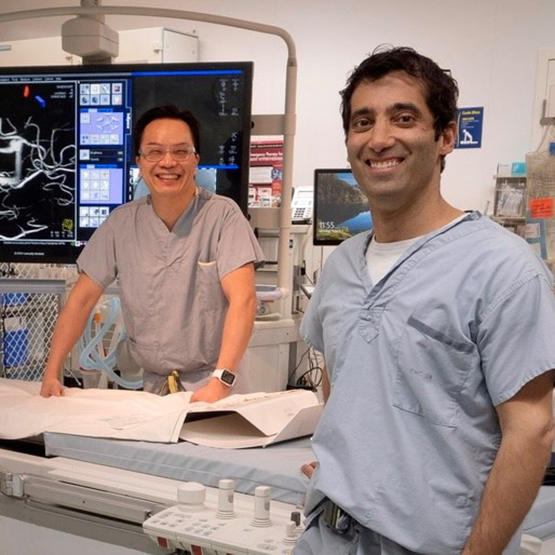March 3, 2021
UCalgary researchers aim to revolutionize treatment for brain aneurysms

A UCeed-funded medical device company founded by two University of Calgary researchers is developing groundbreaking technology to improve the lives of patients with brain aneurysms.
About five per cent of people harbour a brain aneurysm that, if it bursts, can cause devastating neurological effects and be fatal in one-third of cases.
Focused on revolutionizing the treatment of vascular disease, Fluid Biotech has developed the world’s first bio-absorbable, flow-diverting stent, made almost entirely from a material that is naturally absorbed into the body after the stent has done its job. Traditional vascular stents are mesh tubes that are permanently implanted in the blood vessel and are made completely from metal.
“Stents have revolutionized how doctors treat patients with blood-vessel diseases and, within neurosurgery, we can now fix aneurysms using a stent delivered through a small needle hole that only requires an overnight surgery,” says Dr. John Wong, MD, associate professor at the Cumming School of Medicine, who co-founded Fluid Biotech with his research partner, associate professor Dr. Alim Mitha, MD.

John Wong, left, and Alim Mitha co-founded Fluid Biotech with the goal of improving the lives of patients who have brain aneurysms.
Quentin Collier
Since a stent has no purpose after it has finished healing the blood vessel, Mitha and Wong conceived the idea of a dissolving stent for treating brain aneurysms. The researchers are currently testing the stent in a pre-clinical validation phase and have implanted stent prototypes into animal models.
“Fluid Biotech’s stent is designed to disappear over time, so there is no need for patients to take lifelong blood thinners,” Wong says. “This will improve convenience, lessen medication cost, and reduce bleeding risks.”
Since traditional stents are made 100 per cent from metal, they can interfere with radiology tests like computerized tomography (CT) scans and magnetic resonance images (MRIs). This means patients with implanted stents must undergo invasive imaging procedures that have higher risks and costs. The Fluid Biotech stent will allow patients to receive non-invasive testing, improving patient safety and quality of life while reducing the burden on the health-care system.
Stent is 'better scaffold' for cells
Mitha and Wong believe the material of their new stent provides a better scaffold upon which the cells can attach so the blood vessel can heal. Future human testing in clinical trials will also prove whether the polymer stent leads to better patient outcomes.
“We are in the pre-clinical validation phase of our product, so we have implanted stent prototypes into experimental animal models and are accruing data as we speak,” says Wong. “Our technical team has been able to demonstrate a long-term cure of aneurysms in the laboratory, and everything so far looks promising.”
UCeed is a pre-seed and seed-funding program that helps commercialize new technologies and accelerates UCalgary startup companies. Fluid Biotech is one of the first UCeed Health Fund recipients that will leverage the fund to continue pre-clinical testing and product development over the next two years, with the goal of accomplishing the first human implantation.
While the clinician-scientists are focused on improving treatments for brain aneurysm patients, they point out the potential applications of this new technology extend beyond the brain to treat other blood-vessel conditions in the body.
There’s no reason why we can’t leverage what we have learned and created to combat other serious diseases.
- John Wong
Wong says it is an honour to be selected for UCeed funding, and Fluid Biotech’s relationship with the university as a partner has been very positive. The relationship has provided the company with tremendous opportunities to grow as a venture.
“I think the pathway from ‘bedside to bench to business’ can be daunting, but the journey itself has been very rewarding thus far and we are incredibly optimistic about the road ahead,” he says.
Mitha and Wong say they are fortunate to have assembled a talented team to realize a life-changing product.
“With partners like the university providing support, there’s no limit to what we can accomplish,” says Wong.
John Wong is an associate professor in the departments of Clinical Neurosciences, Radiology and Surgery at the Cumming School of Medicine (CSM) and member of the CSM’s Hotchkiss Brain Institute.
Alim Mitha is an associate professor in the departments of Clinical Neurosciences, Radiology and Surgery at the Cumming School of Medicine (CSM) and member of the CSM’s Hotchkiss Brain Institute.
UCeed is a pre-seed and seed-funding program that helps commercialize new technologies and accelerates startup companies in the areas of child and general health, and the Haskayne Student Fund. Learn more.
The University of Calgary’s multidisciplinary Engineering Solutions for Health: Biomedical Engineering research strategy drives solutions to our most pressing health challenges in disease and injury prevention, diagnosis, and treatments. Our biomedical engineering researchers make a significant impact in our communities by extending lives, improving quality of life, promoting independence, and continuously improving the health system.






